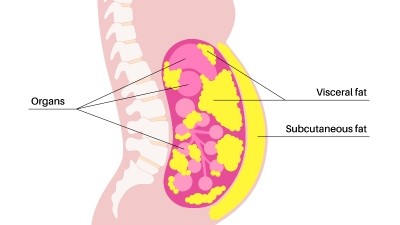Omega-3 supplementation is emerging as a potential adjunct therapy for depression and obesity – review

According to a review published in Journal of Personalized Medicine, there is growing interest in nutritional approaches for treating major depressive disorder (MDD), as current pharmacotherapy has shown to fail in at least 30 to 40% of cases.
In particular, n-3 PUFAs supplementation has been identified as a possible therapeutic option due to the beneficial effects on inflammation, mood, and neuro health.
“Low levels of n-3 PUFAs, including eicosapentaenoic acid (EPA) and docosahexaenoic acid (DHA), have been observed in people with depression, especially those who do not respond to antidepressants,” the authors wrote.
Depression is a risk factor for metabolic dysfunction associated with obesity that is characterised by chronic inflammation, high blood pressure, impaired insulin sensitivity, and leptin resistance.
In fact, depression and metabolic dysfunction increase each other’s risk of progression by 50 to 60%, which signifies a need for effective interventions that address both conditions.
In a study, participants with a BMI of 30 to 40 (obese range) were given 180mg of EPA and 120mg of DHA for four weeks. They were found to have reduced caloric intake and increased fullness, indicating potential effects on satiety and energy consumption.
Notably, high-dose supplementation (4g per day) of EPA has demonstrated a greater effectiveness to induce significant changes in body fat and systemic inflammatory markers in people with obesity.
“Stronger clinical results for improving depression have been seen in pure EPA and EPA-major (at least 60%) groups compared to DHA-major groups, particularly in individuals with high inflammation. Furthermore, supplementation with these fatty acids in the form of fish oil is comparable to commonly used anti-depressant drugs.
“These findings suggest that supplementation with n-3 PUFAs is a promising dietary intervention, especially in pregnant women with gestational diabetes, people with type 2 diabetes, the elderly, and overweight individuals with MDD.”
Nevertheless, the researchers stressed that the efficacy of n-3 PUFAs may vary depending on the complexity of comorbidities and depression severity, highlighting the need for personalised treatment strategies.
Impact on the brain
Recent studies have shown that metabolic dysfunction may cause structural and functional changes in the brain, ultimately contributing to depression’s development.
Neuropsychiatric symptoms — including depressive symptoms — are common in most neurodegenerative disorders, such as Alzheimer’s disease and Parkinson’s disease.
However, they may only be partially or not at all responsive to conventional anti-depressant therapies.
“N-3 PUFAs have shown pleiotropic effects on neural structure and function, and play a critical role in regulating mood. Although their exact mechanisms are not yet understood, they can potentially improve depressive symptoms and delay cognitive decline in patients with neurodegenerative diseases,” the authors added.
For instance, a study where Alzheimer’s patients took 0.8g of EPA and 0.35g of DHA daily, or pure 1.6 g EPA daily, reflected clinical improvement of the inflammatory biomarker chemokine ligand 4 (CCL4) and a slowdown in cognitive decline, specifically in the speech domain.
Further research needed
Prior to 2020, depression affected about 280m people globally.
After the pandemic, there were reportedly about 53.2m new cases of MDD and an overall prevalence of 3152.9 cases per 100,000 population.
Numerous clinical trials have indicated that n-3 PUFAs are generally well tolerated in diverse populations, with no significant adverse effects.
While n-3 PUFAs supplementation has shown promise as an adjunct therapy for both depression and obesity, the optimal dosage and duration of supplementation remain to be studied.
“The traditional one-size-fits-all method of managing depression is limited because of the heterogeneity of symptoms and treatment responses. Therefore, a personalised medicine approach that considers the complexity of comorbidities and individual characteristics, such as metabolic parameters, may offer better outcomes.
“Further research is warranted to better understand how n-3 PUFAs work in obesity and MDD, and to improve the application of supplementation,” the authors concluded.
Source: Journal of Personalized Medicine
https://doi.org/10.3390/jpm13061003
“Personalized Medicine of Omega-3 Fatty Acids in Depression Treatment in Obese and Metabolically Dysregulated Patients”
Authors: Suet-Kei Wu, et al


















